By providing your information, you agree to our Terms of Use and our Privacy Policy. We use vendors that may also process your information to help provide our services. This site is protected by reCAPTCHA Enterprise and the Google Privacy Policy and Terms of Service apply.
The Films of Tim Burton, Ranked

Zack Sharf

In his review of Tim Burton‘s upcoming biographical drama “Big Eyes,” which stars Golden Globe nominees Amy Adams and Christoph Waltz,
Indiewire’s Chief Film Critic Eric Kohn wrote, “It’s as if Burton reigned in his own tendencies at the times when the
movie needed them most of all.” Given how lopsided the battle has been between
style and substance in Burton’s oeuvre, Kohn’s words perfectly summarize why the general reaction towards the director’s filmography has remained divisive. The strength of a Burton picture relies entirely on just how well his idiosyncratic
style services the deeper themes and emotions of the story at hand. There’s no
denying the 56-year-old auteur’s visionary bravado, which turns even his most
thematically hollow films into major theatrical experiences, but as evidenced below, the stronger that Burton’s spellbinding images punctuate his
emotional undertones, the more memorable and thought provoking his films
become. With “Big Eyes” hoping to bring Burton some holiday success, we
look back at the his decades-spanning career for a complete ranking of the his 16 features, from worst to best.
READ MORE: The Films of Ridley Scott, Ranked
16. “Planet of the Apes” (2001)
Aside from Rick Baker’s superbly detailed
makeup, Burton’s “Planet of the Apes” remake is a complete misfire. Thanks to its racially-charged subtext, the “Apes” story
will forever be emotionally relevant, so the problem here has less
to do with Burton making a purposeless remake and more to do with Burton’s
artistic sensibilities being completely wrong for the material. “Apes” is a blockbuster that demands grit and grounded realism for all of its themes to have a proper weight (which is something
the new “Apes” movies do so well), and although Burton certainly tries his best (his use of
real human extras brings an extreme authenticity to the battle scenes, something
Peter Jackson would perfect a year later in “The Two Towers”) he can’t help but struggle without the
fantastical wit that makes the majority of his work so endearing. Burton ends up making
a by-the-numbers blockbuster that, while aesthetically pleasing, strips him of
all the things that make him a singular filmmaking force. None of the
traditional Burton-isms work within the “Apes’ story structure, and therefore
the movie finds the director soullessly out of his element. Mark Wahlberg’s
lifeless hero and the film’s ambiguous twist ending (which, again, is a complete
departure from Burton’s more tidily wrapped up conclusions) do the director no favors
either. “Apes” may be the biggest hiccup in Burton’s filmography, but you have
to applaud the director for ambitiously trying. At the very least, “Apes'” failings make you even more grateful for his auteur abilities.
15. “Alice in Wonderland” (2010)
Burton’s big-budget reimagining of the classic
Lewis Carroll fantasy followed in the 3D footsteps of “Avatar” and grossed $1 billion at the worldwide box office, making it the highest
grossing film of the director’s career. But while the trailers hinted at a
perfect union between filmmaker and story, the end result was more of a
bland Hollywood blockbuster than the warped childhood nightmare many fans were
hoping for. The cast is well assembled here, particularly an irascible Helena
Bonham Carter and a young Mia Wasikowska, who brings an adolescent gusto to
Alice’s journey from bored wife-in-the-making to resilient Joan of Arc-hero,
but the film follows such a predictable three-act structure that none of the
imaginative digital landscapes can save it. By the time Burton indulges in his numb,
CGI-stuffed climax, which features battles not only between opposing armies but also between
Alice and a dragon, the film feels so safe there’s hardly any original wonder left
to make it memorable. Burton’s “Alice” ignores his usual passion for oddball
fairytales and adheres too closely to the conventions of modern CGI
blockbusters.
14. “Dark Shadows” (2012)
One of Burton’s biggest
commercial misfires (it grossed a mere $79 million domestically opposite a
pricy $150 budget, according to Box Office Mojo), “Dark Shadows” finds the
director nervously juggling tones in what is the strangest adaptation of his
career thus far. Instead of capitalizing on the melodrama and moody atmosphere
of the cult classic ABC soap opera, Burton decides to craft a dry
fish-out-of-water comedy that exists in an awkward limbo between deadpan and over-dramatics. Burton was clearly hoping the macabre visuals would create a comedic juxtaposition to the groovy
70’s vibes, but the two distinct
tones act more as tireless adversaries than as stimulating tonal counterpoints.
It doesn’t help that cast members Jonny Lee Miller, Michelle Pfeiffer and Chloe
Graze Moretz use a deadpan delivery that fluctuates between smart and lazy, or
that Eva Green gives such a delightfully over-the-top performance as the
villainous witch that you wish Burton stuck to his guns and just made a
maniacal soap opera out of the whole story. By the end, “Dark Shadows” is so
widly uneven in tone that you’re not even sure if the original show was an inspiration for the director to begin with. Considering just how much of a sly comment the
movie could’ve been in the age of lightweight “Twilight”-era vampires, “Dark Shadows” is a missed opportunity all around.
13. “Mars Attacks!” (1996)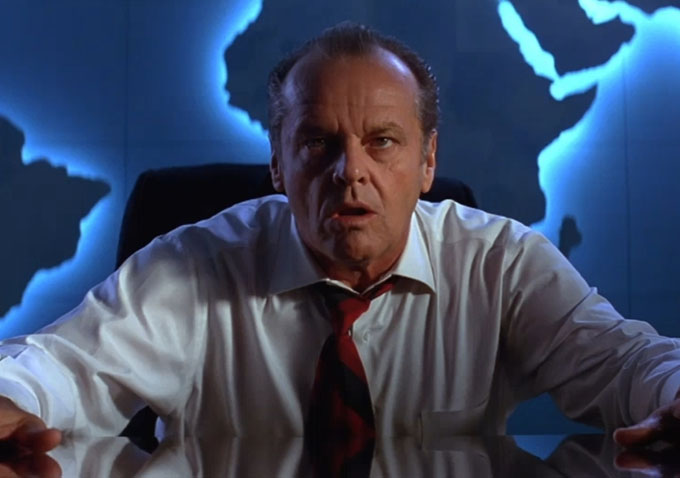 “Mars Attacks!” is one of Burton’s most
“Mars Attacks!” is one of Burton’s most
critically reviled films, but it’s impossible not to show it some love when Tony-winner and Oscar-nominee Glenn Close gets accidentally crushed under a falling chandelier. That scene alone summarizes
what makes the film such a sloppy joy – it’s a rickety science fiction B-movie
masquerading as a big-budget, star-studded blockbuster. Only Burton could
muster up an epic A-list ensemble for such a downgrade movie, and only Burton
could get a $100 budget for a film that should look and feel like it was made
for mere thousands. The more blockbuster-friendly “Marks Attacks!” tries to be
the more it loses sight of its genre roots, and it ultimately spends more time
honoring the B-movie than it does actually indulging in its more rundown elements.
The film may get the low-grade feel of the genre picture right, but its story
is goofy-dumb when it should be goofy-endearing. You can blame that mostly on
its haphazard structure, which prevents its thin political satire and tacky
B-movie clichés from ever developing into witty filmmaking
conceits. But of all of Burton’s lesser efforts, this is the only one boiling
over with passion from start to finish.
12. “Charlie and the Chocolate Factory” (2005)
The hallucinatory boat ride in Mel Stuart’s “Willy Wonka and the Chocolate Factory” (1971) is one of the darkest moments in kid-friendly cinema, so it’s rather surprising that instead of exploiting
the sinister center of Roald Dahl’s sweet tale, Burton decides to narrow in on
the lonely heart of its central characters. Burton’s version is
more sad than scary as it turns the eclectic chocolatier into an isolated man-child
plagued by daddy issues. In a Michael Jackson-meets-Pee-wee-Herman performance,
Johnny Depp exposes the plagued, bruised heart of arrested development, one
that doesn’t need all of the conveniently timed flashbacks to achieve its
emotional relevancy. Ultimately, “Charlie” shows Burton expertly taking beloved
source material and making it wholly his own. Sadness practically haunts the
entire picture. Stuart’s Oompa Loompas were musically menacing, for
instance, but Burton opts for deliriously upbeat songs instead, drawing out the sad pity of childhood addictions through the paradox of mourning and celebration.
But like so many of Burton’s recent
efforts, the reliance on digital imagery threatens to derail the entire project. Similar to Stuart’s original, Burton’s
early blockbusters work so well because the sets are authentic and the effects
are practical, which helps ground even the most magical of settings in some
form of identifiable reality. Nothing about the way “Charlie” looks is at all
tangible (which is a similar issue facing “Alice in Wonderland”), and therefore
the film loses a sense of urgency because it’s so far removed from what we
think could be a living, breathing universe.
11. “Corpse Bride” (2005)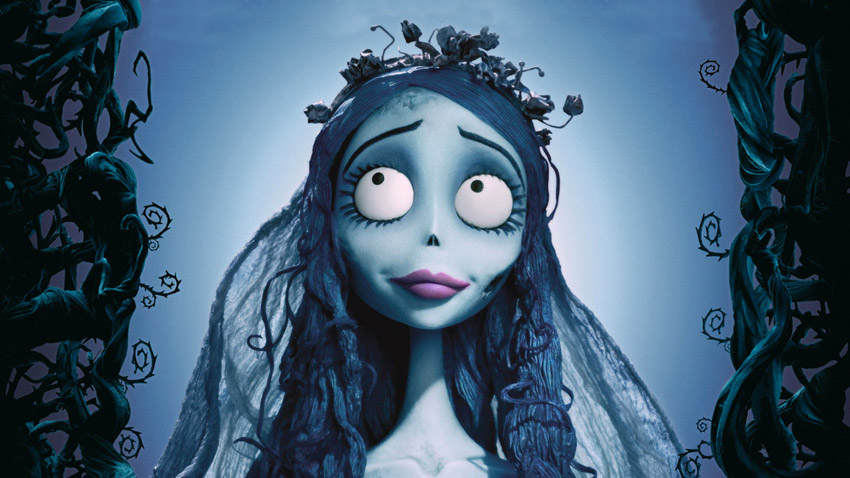
Between “Charlie and the Chocolate
Factory” and this Oscar-nominated Best Animated Feature, 2005 was probably the
last dynamite year for Burton. “Corpse Bride,” the director’s ghoulishly fun
stop motion marvel, features a roster of exceptional voice work (courtesy of Johnny Depp,
Helen Bonham Carter, Emily Watson, Christopher Lee and more) and a winning romantic
fable about love and loss that doesn’t come up short in terms of dark
poignancy. Unlike “Dark Shadows,” “Corpse Bride” never flinches as it
confidently balances its Victorian-era bleakness with a lively spirit that pops
every time a toe-tapping musical number begins. The film is so eye-poppingly
stitched together that it practically overflows with a celebration of the
afterlife. Burton has often turned to the macabre as a way of reinforcing one’s
urge for life and love, and while “Corpse Bride” explores this theme with
the one-note simplicity of a children’s book, it does so with such artful
dedication that it’s impossible not to be swept up by its love for the living
dead. It’s a Burton romp if there ever was one.
10. “Pee-wee’s Big Adventure” (1985)
Given how intently Burton’s films rely on childhood themes,
it’s sort of perfect that the director’s debut came in the form of “Pee-wee’s Big
Adventure,” a weird screwball mystery that somehow manages to mix
Buster Keaton and Vittorio De Sica. How’s that for a first feature? Not much of
the film suggests Burton’s goth obsessions, but his use of bright toy colors
and Danny Elfman’s fantastical score place the film in a reality just above our
own, just as so many of his subsequent films do too. Paul Reubens’ slick-haired Pee-wee is
also the prototype for the Burton protagonist – a shy, misunderstood man-child
who must navigate a strangely adult world full of dark undertones in order to
preserve his adolescent charm. “Pee-wee” may be chock full of childish physical comedy that would make Charlie Chaplin proud, but it’s also a
warped adventure that takes its one-note premise (Pee-wee trying to find his
stolen bike) and jam packs it with a surreal quality that only adults can
truly appreciate. From a nightmare of doctor-operating clowns to a gag
involving Twisted Sister, so much of the film depends on the convergence of
childhood and adulthood that the rest of Burton’s career seems inevitable in retrospect. No wonder “Pee-wee” remains a cult-classic.
9. “Sleepy Hollow” (1996)
Before Burton’s adaptations got soft with Disney, blockbusters such as “Sleepy Hollow” proved just how mature he could revise a beloved childhood story and mine it for all its dark beauty. Looking back, acquiring a $100 million budget for such a fantastically daring vision is probably one of the riskier moves of Burton’s career, but there’s something transfixing about “Sleepy Hollow” that pays off as a result. The story is a bit too routine for all its peculiar images (and there’s one too many evil-explaining monologues, even though Miranda Richardson hams it up perfectly), but my god what a stunner this film is. In the hands of gifted cinematographer Emmanuel Lebezki and Oscar-winning Art Directors Rick Heinrichs and Peter Young, “Sleepy Hollow” is one of Burton’s most hauntingly constructed films. Imagining the town of Sleepy Hollow as a Puritan-meets-Victorian-goth community, Burton creates one of his most fully realized worlds, one where the trees curve like fingernails and the fog never stops eerily moving in. This dark adventure is one of the only times Burton’s style is so grand and operatic that it’s easy to forgive the more conventional substance at play. We could look at the brilliantly rendered Tree of the Dead all day and never fail to be impressed.
8. “Frankenweenie” (2012)
With “Dark Shadows” and a producing credit on
the dreadful “Abraham Lincoln: Vampire Slayer,” 2012 was one deadly year for
Tim Burton. But just when you thought the director was running on empty, he roared back to life with “Frankenweenie,” a freaky little tale about undying love with spooks and
heart to spare. Turning his own 1984 live-action short into an electric
black-and-white stop motion dazzler, Burton hones in on his emotions while
telling the story of a social outcast and his dead pet dog. The
story here is simple enough to be universally accessible, and by finally
giving us a screenplay with real heart, the director manages to provide a
humane pulse to all of the macabre theatricality we’re used to seeing from him. “Frankenweenie” triumphs as both a love story and a wonderfully imagined
homage to the 70’s B-movies Burton grew up on (take that, “Mars Attacks!”). Briskly paced and right-to-the-point, “Frankenweenie” is probably the most efficient film in Burton’s filmography,
one that will remind any cautious Burton fan of what it was that made him or her fall so in love
with the director in the first place.
7. “Batman” (1989)
Taking the grim elements of the DC comic and bringing them to jaw-dropping life on the big screen, Tim Burton’s “Batman” is one of the most beautifully rendered superhero films ever made. From the
streets of Gotham to the shadowy caverns of Bruce Wayne’s bat cave, every set
is so meticulously constructed and refined in detail that watching this film is a marvel to behold. “Batman” may not necessarily be a great superhero
film, primarily because it spends much more time gleefully obsessed with Jack
Nicholson’s scene-chewing Joker, but as an introduction to the world of Gotham City and to the moral dilemmas plaguing Bruce Wayne, it’s pretty flawless. The way in
which Burton creates a visual graphic novel on the screen allows the setting to
exist in a singular reality all its own, and, as a result, the violence walks a fine
line between exploitation and accurate fear, which is perfect considering the
maniacal evil of the film’s antagonist. Unlike Nolan’s recent trilogy, Burton
excels at removing Gotham from any real world semblance while still filling it
with emotionally resonant issues and characters. In other words, it’s just like
the comic book.
6. “Sweeney Todd: The Demon Barber of Fleet Street” (2007)
Burton’s musical sensibilities are often
energetic (“Corpse Bride”) or comically inclined (“Beetlejuice”), so it was
quite the surprise to hear the director would tackle the musical adaptation of
Stephen Sondheim’s cold-blooded “Sweeney Todd.” And yet, Burton brings such an
opulent visual eye to his Victorian-era setting and invigorates his characters’
paths of revenge with such blood-boiling passion that the entire production
proves to be one of Burton’s most successful risks. His attentive staging of
the music heightens each song’s importance to the characters, which is imperative for any Sondheim interpretation. The chemistry he’s able to ignite between
Depp and Bonham Carter facilitates one of the best teams in his entire
catalogue. There’s also the creative use of gore, which Burton wisely controls so that every act of violence rips off the screen in a way not possible in the stage version. The movie has the musical’s sense of wonder and intimate scope, but it utilizes the innate ability of film to make things up-close-and-personal by putting you right in
the chair for Todd’s sinister cuts. By slicing open the cinematic
potential of Sondheim’s story, Burton’s musical beautifully realizes the world
of “Sweeney Todd” without sacrificing the original source material’s heavy
themes and character-building music.
5. “Beetlejuice” (1988)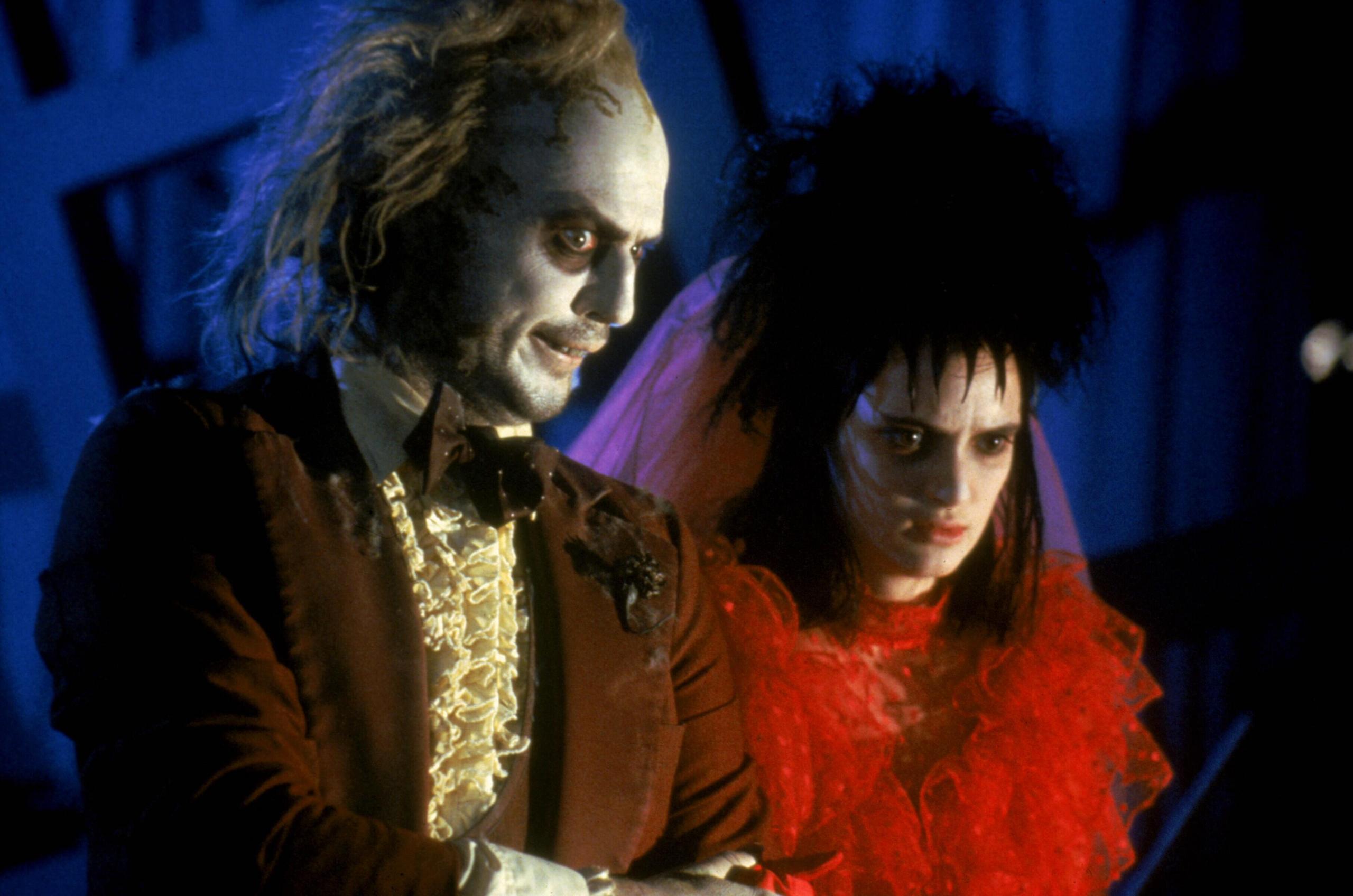 In what essentially amounts to a giant prank film, with Michael Keaton’s ghoulish performance as the eponymous ghost serving as the ringleader of devious hijinks, Burton’s second feature is undoubtedly his most juvenile. But therein lies the power of not only “Beetlejuice” but also of Burton’s abilities as a storyteller. As we’ve mentioned, the director loves using an adult atmosphere to subvert the nature of childhood antics, and “Beetlejuice” is the most fun the director has ever had exploring this central theme of his. The film is built around the tensions between parents and children, both internally and externally, and the way Burton uses juvenile shenanigans (who can forget the comical distortion of monster faces, or when Geena Davis and Alec Baldwin dress up in white bed sheets to be ghosts) to prove how relationships are formed through adolescent behavior, only for adulthood to threaten those very bonds, is rather profound for such a shamelessly foolish comedy. Whereas Burton’s main characters are often overgrown children, the entirety of “Beetlejuice” seems to exist in arrested development, which allows for its more adult themes to carry an important weight. Burton’s best films have a way of spiritually sneaking up on you, and “Beetlejuice” certainly falls in this category.
In what essentially amounts to a giant prank film, with Michael Keaton’s ghoulish performance as the eponymous ghost serving as the ringleader of devious hijinks, Burton’s second feature is undoubtedly his most juvenile. But therein lies the power of not only “Beetlejuice” but also of Burton’s abilities as a storyteller. As we’ve mentioned, the director loves using an adult atmosphere to subvert the nature of childhood antics, and “Beetlejuice” is the most fun the director has ever had exploring this central theme of his. The film is built around the tensions between parents and children, both internally and externally, and the way Burton uses juvenile shenanigans (who can forget the comical distortion of monster faces, or when Geena Davis and Alec Baldwin dress up in white bed sheets to be ghosts) to prove how relationships are formed through adolescent behavior, only for adulthood to threaten those very bonds, is rather profound for such a shamelessly foolish comedy. Whereas Burton’s main characters are often overgrown children, the entirety of “Beetlejuice” seems to exist in arrested development, which allows for its more adult themes to carry an important weight. Burton’s best films have a way of spiritually sneaking up on you, and “Beetlejuice” certainly falls in this category.
4. “Batman Returns” (1992)
Like the greatest sequels in movie history, “Batman Returns” is the emotional match point to “Batman’s” world-building set up. All of the original’s Gothic visual splendor is preserved here, but Burton wisely uses the sequel to hone in on his titular hero and to dig deep beneath the vigilante to find out what it is that motivates the Caped Crusader into being Gotham’s Dark Knight. It’s obvious from Danny DeVito’s hammy Penguin that nothing about this world is grounded in our reality, but the mental battle at the film’s core allows the out-of-this-world visuals to really explode on an emotionally realistic scale. What makes the Penguin and Michele Pfeiffer’s vivacious Catwoman such great villains is how instead of seeking world domination through giant armies, they build their master plan around manipulating Gotham’s perception of Batman. The Penguin uses his political power to frame our hero’s image, which forces the film’s drama to rest on the balancing act of whether or not Batman will be the hero he was born to be or the corrupt, lawless vigilante the Penguin is selling him as. It’s an emotionally constructed story arc, and it makes “Batman Returns” the richest Burton blockbuster of all time.
3. “Big Fish” (2003)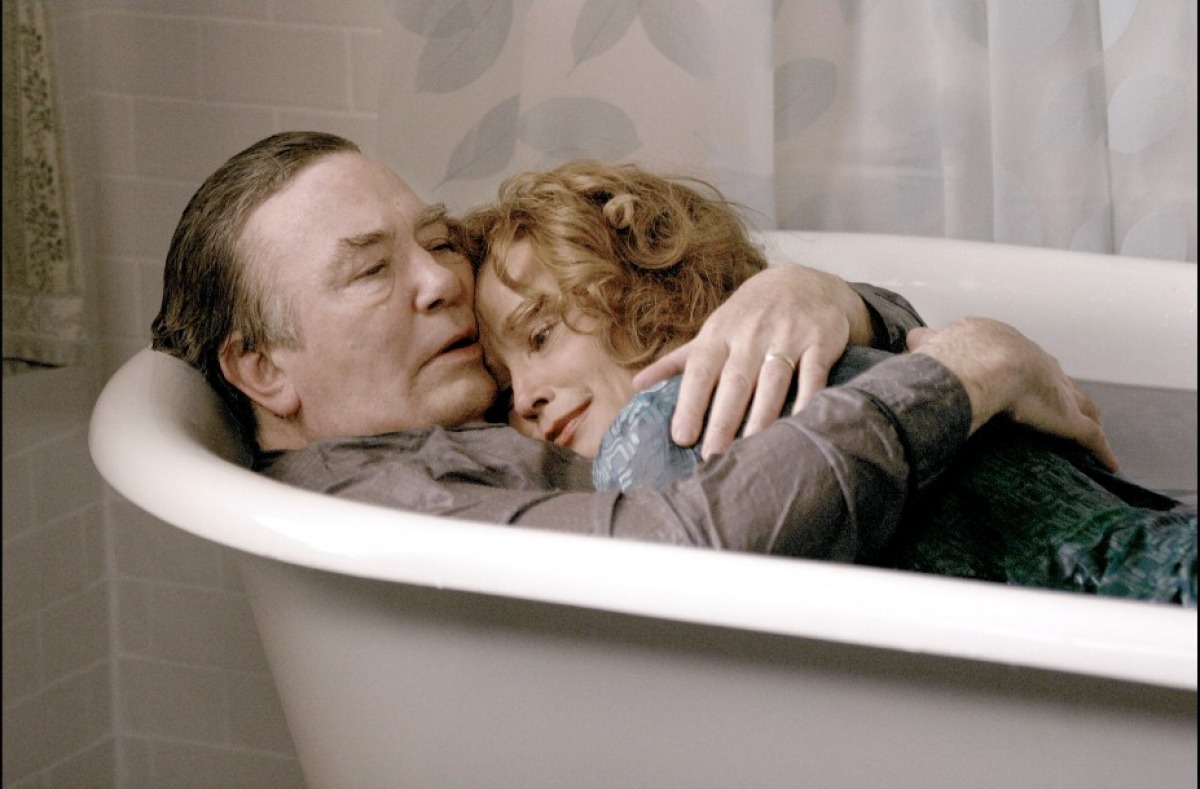 Burton has made a career out of exploring the
Burton has made a career out of exploring the
struggle between adolescent wonder and adult grimness, and “Big Fish” is the
director’s magnum opus in terms of digesting this theme for maximum dramatic
effect. He might rely on narration a bit too much, but there’s almost a “Shawshank Redemption”-quality to the voiceover work here, with Albert Finney’s
narration being used less as exposition and more as a window into the humble
soul of a life lovingly fulfilled. The entirety of the film boils down to
whether or not Edward Bloom’s flashbacks are true or not, and the way Burton
brings a sense of Southern Gothic fantasy to the vignettes forces the viewer to
be swept up in each flashback’s fable-like beauty. Each memory is beautifully
rendered, with a sensory overload of colors (the meadow of yellow flowers is
unforgettably stunning) and a washed out white haze giving every moment a
too-good-to-be-true glow. And yet Burton never loses sight of the film’s
beating heart, and he gives even the most unbelievable elements (a giant, a
mermaid) a feeling of deep humanity. By the time Edward is being laid to rest
surrounded by all of the loved ones from his past, the truth of the events
barley matter considering just how strong the empathy and pathos of the story
rushes through you. That scene alone is the biggest emotional wallop of
Burton’s entire career.
2. “Ed Wood” (1994)
“In doing a biopic you can’t help but get inside
the person’s spirit a little bit,” Burton once said, and his words here define what makes “Ed Wood” his most personal and intimate feature film to
date. Way more than just a “Mars Attacks!”-style homage, Burton’s biographical comedy-drama
about the eponymous cult filmmaker embodies the soul of its subject matter to
reveal exactly what it was about Wood’s low-budget charm that inspired Burton
to start a career glossed in oddity-fueled wonder. The film’s disjointed nature and Burton’s go-for-broke
comedy not only feel sophisticatedly crappy like a Wood picture itself, but they also infuse his biography with the entire sprit of the subject. Take a rather
ridiculous scene of a mob chasing after Wood following the disastrous premiere
of “Bride of the Monster” as an example of everything “Ed Wood” does
right. The surreal element of an angry mob is something Wood would have
certainly approved of, and it’s importance to the story has nothing to do with
whether or not the event actually happened (which it most likely did not), but
everything to do with how Wood’s own self doubt over the picture would manifest itself into the anxious screwball energy of an angry chase scene. Burton has an affinity for drawing the
reality out from under disillusionment, and nowhere does he do that more intuitively
than in “Ed Wood.” If the upcoming “Big Eyes” is even a quarter as intimately
inclined as “Ed Wood,” it will certainly be another introspective Burton
success story.
1. “Edward Scissorhands” (1990)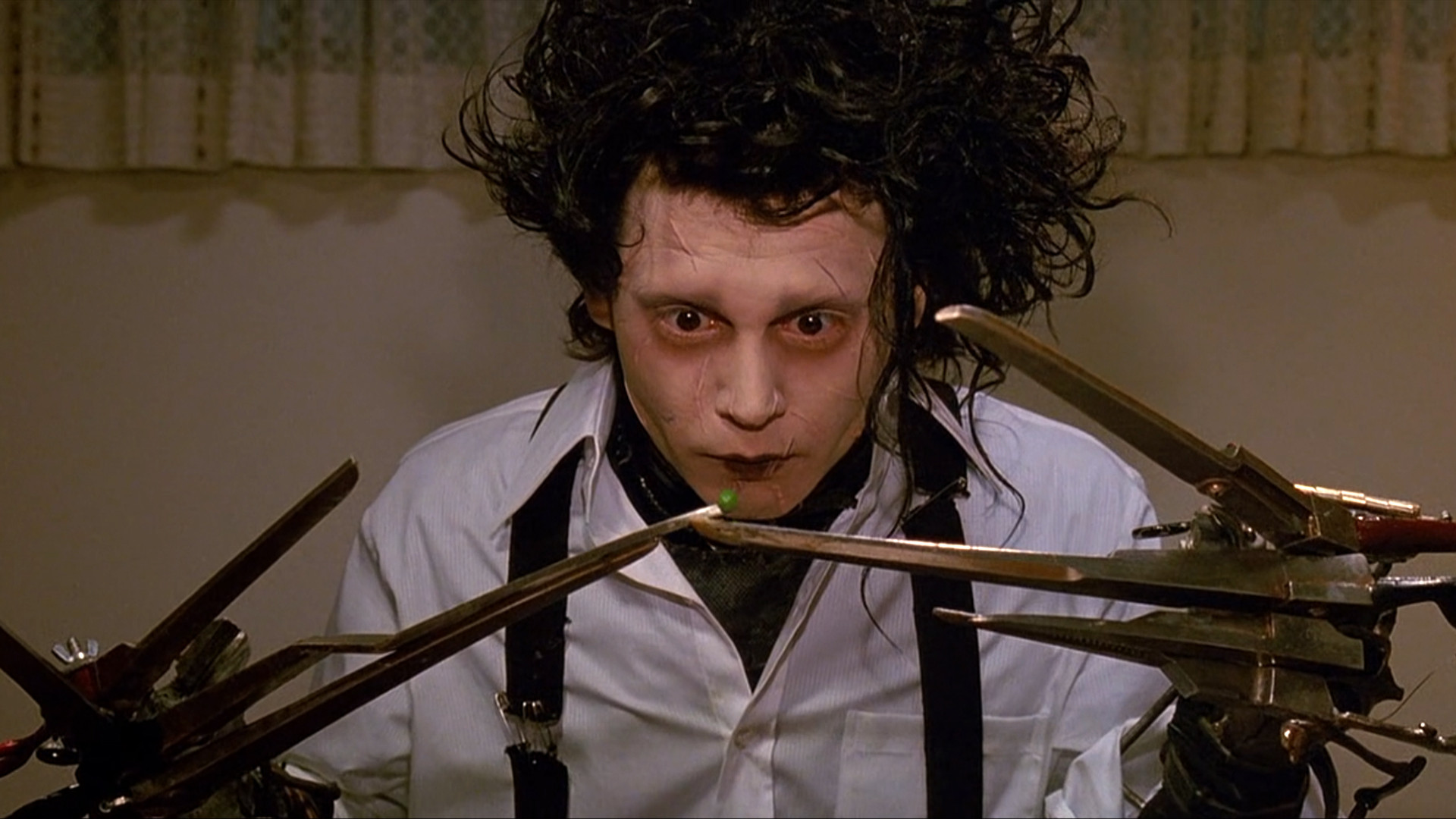 “Edward Scissorhands” is Burton’s best because of its immaculate marriage of substance and style. No other film uses
“Edward Scissorhands” is Burton’s best because of its immaculate marriage of substance and style. No other film uses
Burton the auteur as thought provokingly as this gothic fairytale. All
of the classic Burton staples are here, from Danny Elfman’s score of angelic
wonderment to the story of a misunderstood protagonist whose frightened boyish
innocence must reckon with the dark adult world, but it’s the way Burton’s visuals
function as potent metaphors that make the film’s imagery integral to its
thematic core. The pastel homes and prim landscapes create a pop art version of
1950s suburbia, one that has the idyllic charm of a storybook and the aura of
domesticated Americana. But as the ominous tides of the story boil underneath
such utopic compositions, Burton is able to use his visual palette as a
metaphor for the dangers of group mentality and the empty conformities of
materialism. These are heavy-handed comparisons for sure, but the beauty of “Scissorhands” is how boldly it integrates these societal comments
through the visuals so that they may support, and not take away from, the
central story of human connection. For this reason, “Scissorhands” is the grandest cinematic fairytale ever conceived, one that looks and feels
like the bedtime stories of our youth due to the way it balances so many optimistic
moral lessons by exploring their dark consequences. Every Burton film has shades of “Scissorhands'” greatness, but none come
close in the way it encapsulates everything about Burton that makes him one of
the most unique minds in movie history. “Edward Scissorhands” is quintessential
Burton, no questions asked.
By providing your information, you agree to our Terms of Use and our Privacy Policy. We use vendors that may also process your information to help provide our services. This site is protected by reCAPTCHA Enterprise and the Google Privacy Policy and Terms of Service apply.

















